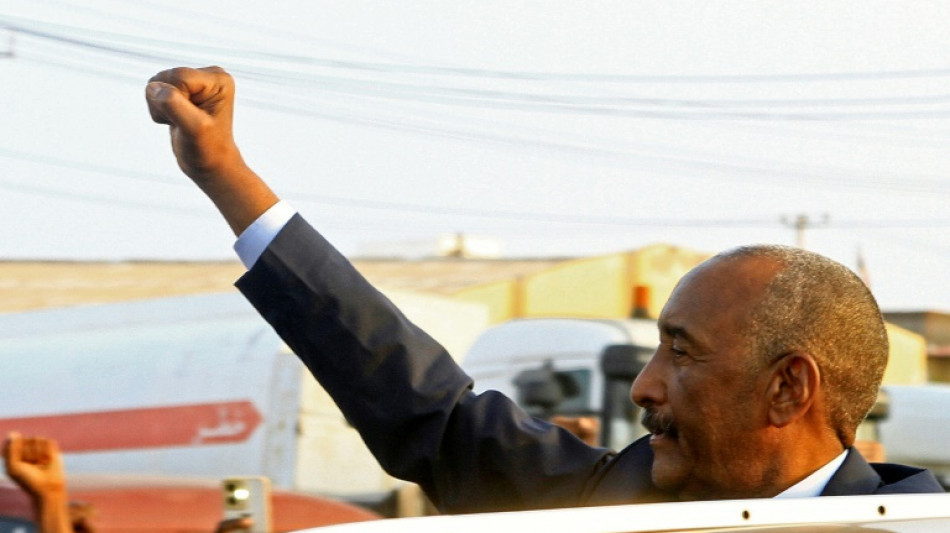
| SCS | 0.12% | 16.14 | $ | |
| RYCEF | 0.29% | 17.05 | $ | |
| RBGPF | -0.27% | 81.57 | $ | |
| VOD | -1.05% | 13.83 | $ | |
| CMSC | 0.02% | 23.005 | $ | |
| RIO | -1.3% | 83.79 | $ | |
| RELX | 0.74% | 42.495 | $ | |
| NGG | 0.15% | 79.51 | $ | |
| JRI | 0.66% | 13.73 | $ | |
| BCC | 5.74% | 77.945 | $ | |
| CMSD | -0.26% | 23.539 | $ | |
| BCE | 1.71% | 23.735 | $ | |
| GSK | 0.04% | 50.64 | $ | |
| BTI | 1.09% | 53.875 | $ | |
| BP | -0.43% | 33.525 | $ | |
| AZN | -0.26% | 94.915 | $ |

US blacklists Sudan army chief as Blinken regrets failure to end war
The United States on Thursday imposed sanctions on Sudan's army chief days after blacklisting his main rival, as outgoing Secretary of State Antony Blinken voiced regret at his failure to end the brutal war.
The Sudanese army has been at war with rival paramilitaries since April 2023 in a conflict that has killed tens of thousands of people and uprooted more than 12 million, including millions who face a worsening hunger crisis.
The Treasury Department announced sanctions on Abdel Fattah al-Burhan, the leader of the Sudanese Armed Forces, a week after similar action against Mohamed Hamdan Daglo, Burhan's former deputy who heads the rival Rapid Support Forces (RSF).
"Taken together, these sanctions underscore the US view that neither man is fit to govern a future, peaceful Sudan," Blinken said in a statement.
In the latest sanctions announcement, the Treasury Department accused the army of attacking schools, markets and hospitals and using food deprivation as a weapon of war -- although it stopped short of alleging genocide, a charge leveled at the RSF.
The United States previously had steered clear of sanctions on the two leaders so as to preserve diplomacy with them.
But Blinken, who leaves office on Monday, said the army had repeatedly failed to join peace initiatives, although he hoped President-elect Donald Trump would keeping trying on Sudan.
"It is for me, yes, another real regret that when it comes to Sudan, we haven't been able on our watch to get to that day of success," Blinken said at a farewell news conference.
There have been "some improvements in getting humanitarian assistance in through our diplomacy, but not an end to the conflict, not an end to the abuses, not an end to the suffering of people," he said.
The war erupted over a failure to integrate the army and the RSF, with joint US and Saudi diplomacy succeeding only in limited humanitarian agreements including on the entry of aid.
More than 24.6 million people -- around half of Sudan's population -- face "high levels of acute food insecurity," according to a recent review by the UN-backed Integrated Food Security Phase Classification.
- Diminishing options for US -
The United States last week said that the RSF has committed genocide in Darfur through systematic killings and rapes of the ethnically African people there.
The atrocities are an echo of the scorched-earth campaign by the RSF's militia predecessor, the Janjaweed, also accused of genocide two decades ago in Darfur.
The US special envoy on Sudan, Tom Perriello, pointed to actions taken last time in Darfur -- "naming and shaming" of perpetrators, a "tremendous global activism" and the prospect of African Union intervention.
"Most of those tools are either off the table completely or seriously diluted right now," Perriello said at the Council on Foreign Relations.
Perriello, a former Democratic congressman who also leaves office Monday, said the United States was also no longer the same "major bank for the world" that can spell dire economic consequences through sanctions.
US options are "much weaker in a world where people can go to other countries and get billion-dollar checks without having any conversations about human rights and democracy," he said.
Perriello also voiced shock that regional power South Africa welcomed RSF leader Daglo on a visit and that there was not "much of an outcry from South African civil society."
But he said African powers increasingly focused on domestic issues and "want to be seen as economic powerhouses of the future, not necessarily the moral police."
The Sudan conflict has brought in a series of foreign players, with the United Arab Emirates facing repeated charges of arming the RSF.
Perriello saluted the role of Egypt, saying he was surprised to work so closely but that Cairo exerted pressure on the Sudanese army in the interest of decreasing refugee flows.
T.Abato--IM

